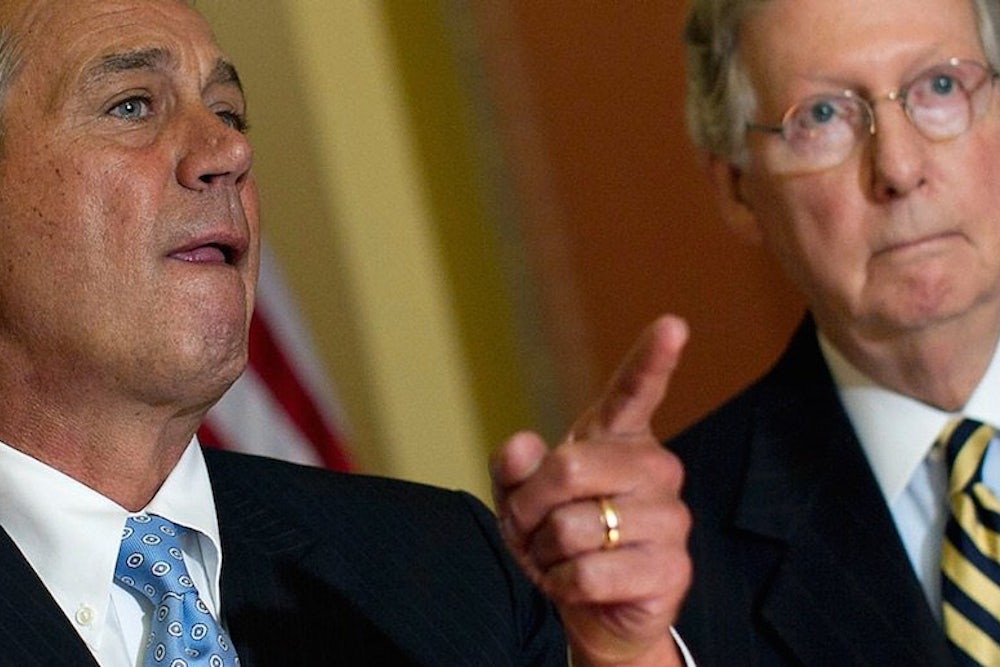There’s an any-port-in-a-storm quality to Speaker John Boehner’s piloting of the House, and nothing illustrates that better than Republican squabbling over whether and how to fund the Department of Homeland Security.
Why is the Department of Homeland Security about to run out of money? Because back in December, conservatives wanted to use a government funding deadline to pick a big fight with President Obama over his deportation relief policies, and rather than risk a shutdown, or wrest the till back from the hardliners, GOP leaders decided to give them whatever they could cobble together. What they came up with was a harebrained scheme to fund all government operations except for Homeland Security through the end of the fiscal year. Meanwhile, they extended DHS funding through February only, and promised to fight Obama’s deferred action programs in the context of a narrower threat to shut down the department that enforces immigration policy.
The problems with this strategy were obvious from the outset. As I observed at the time, denying DHS an appropriation wouldn’t freeze Obama’s deportation programs, because the agency implementing them is self-financing. In fact, denying DHS an appropriation wouldn’t accomplish very much at all; as a national security hub, most of its functions are considered essential, and thus exempt from the kinds of closure protocols that apply to national parks and Social Security administrative offices.
The upshot is that Republicans are threatening to infuriate DHS employees and their allies, weaken DHS functionality, and, in a losing p.r. campaign, surrender the mantle of national security back to Democrats—all unless Obama agrees to rescind his own executive actions. As muggings go, this isn’t much different than screaming, “Your money or my life!” No less an immigration hardliner than Representative Steve King understands that the plan has always amounted to capitulation.
But having promised a brawl, Boehner must now go through the motions, which look more and more contrived as prominent Republicans—particularly in the Senate—step in to admit that they will fund DHS, come what may.
This week, John Cornyn, the number two Senate Republican, told CNN "we're not going to take any chances with the homeland." Cornyn is showing his cards here, but he's also putting the House's strategy up for ridicule. Because House Republicans must proceed as promised, Cornyn et al must now pledge not to incur the mostly-imagined risk that his House counterparts are supposedly inviting. When Republicans let appropriations lapse in 2013, and DHS was just one of the many agencies ensnared in the shutdown, domestic security wasn't the core political concern. By centering the fight around DHS alone, though, conservatives have left themselves no choice but to swallow Democratic demagoguery—their strategy is premised on the notion that Obama will relent when the threat to national security becomes too great. There are no national park closures to obscure the fact that the fight is over something called the Department of Homeland Security, and you gain no leverage by threatening to withhold funds from DHS, if you admit that withholding funds from DHS doesn't really accomplish much.
Senate Republicans have other political concerns as well.
Dean Heller, a Republican senator from Nevada, worries that forcing a fight with Obama over immigration policy, in the context of an appropriation, invites the risk that certain members lapse into referring to affected immigrants "in a way that is offensive.” Mark Kirk of Illinois—a vulnerable incumbent—believes any "government shutdown scenario" would be "a self-inflicted political wound for Republicans."
Where Senate Republicans would like to avoid deadline-driven fights altogether, Boehner promises to drag them into those fights at the behest of conservatives, even when he knows he can't win. His inability to admit the obvious, while Republican senators feel unencumbered, reflects the dramatically different pressures a House speaker and a Senate majority leader face. The strategic rift thus isn’t limited to DHS, but will emerge any time Senate Republicans see political dividends in a compromise that House hardliners won’t accept.
To avoid an embarrassing, damaging lapse in highway funding, for instance, senate Republicans, including Orrin Hatch, who helms the tax writing committee, are warming to the idea of replenishing the highway trust fund by increasing the gas tax. Collapsing gas prices have made the prospect of a higher gas tax less punitive, and lent an obvious idea bipartisan support.
Naturally, Boehner can’t accept this.
At least not yet. The logic of a higher gas tax might become more appealing to him as the funding deadline nears, just as we assume the logic of extending DHS funding cleanly will overwhelm him before too long. As a template for addressing pressing national business, taking symbolic stands like these is more tedious than dangerous. But foot-dragging tedium can become dangerous when the pressing business is increasing the debt limit or responding to unanticipated crises.
